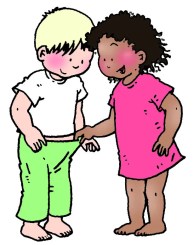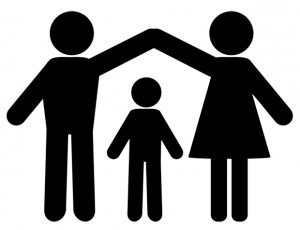sexualdevelopmentinchildhood

Our sex (also called ‘gender’) is determined at the moment of conception by the sperm cell that penetrates the egg cell. A sperm cell with the Y chromosome will produce a boy, a sperm cell with the X chromosome will produce a girl. Only one sperm cell can enter the egg cell. About half of the sperm cells carry an Y chromosome, the other half an X chromosome. In the early stage of development, a basic structure is formed that later produces female or male sex organs.
Gender
When a baby is born, the doctor inspects it and congratulates the mother with her well-shaped son or daughter. In about 1 in 10,000 births the gender is not quite clear. The doctor examines those babies further and advises the parents about the gender. When surgery is indicated, it will be done as soon as possible and the child is raised from the beginning as either a boy or a girl. Thus the genetic sexual difference is reinforced by upbringing and social habits. In the case of transsexuality, this may lead to conflicts which put into question the sexual system itself. Just like walking, eating and talking, sexual development has certain stages, the duration of which are determined by inner development as well as interaction with the environment.
Sexual feelings
Babies sometimes get sexually excited. They get a hard-on penis or clitoris and are able to get an orgasm: their heads turn red, they breathe faster and their abdominal muscles contract. Sexual feeling is present from the very beginning of life. It is distinguishable from other kinds of pleasurable feelings that children experience in activities like sucking, munching, hopping, swirling, swinging, scratching, rubbing, cuddling, hugging, playing with food, water, paint, clay or mud. People differ widely in the strength and orientation of their sex drive. By the time children are four years old they know whether they are a girl or a boy, what the difference is between the two, and where children come from. Sometimes gay and transgender people realize that they are “different” as early as four. At kindergarten age children fall in love and think and talk about whom they’d like to marry when they grow up. In elementary school they become clearly aware of the secrecy and taboo around sex. They may tell dirty jokes and use words that evoke exciting responses, they may invent games for the purpose of looking at each other’s bodies or kissing each other. Twelve year olds usually are informed about the role of the different sexes in procreation and what they can expect when they reach sexual maturity, possibly also how pregnancy can be prevented. Most children have few memories of their early childhood, because the memory function is not fully developed yet. When you look back at your earliest memory it was something that made a deep impression. It may be mixed with what people told you or pictures you have seen. Memory cannot always distinguish sharply between our own experience and information from other sources. We tend to create a life script, which is a mixture of fact and fiction.
Sexual experiences
We can be pretty sure however that our first sexual experiences are really our own memories, because they are usually not observed by others and not shared. Do you for example remember getting sexually aroused for the first time and what that caused? Consciously touching and stimulating your genitals or masturbating? Falling in love with someone of the other (or the same) sex or playing sexual games with friends, brothers and/or sisters, cousins?
First conscious sex-related experience
The age of the first conscious sex-related experience may vary from between four and fourteen. Most children have played sexual games with others, have masturbated, have created fantasies and images about making love based on what they have seen on tv, in movies, read in books; the jokes and stories they have heard (when the grown-ups thought they weren’t listening) and what their parents have told them. Sex is more complicated to learn in our society than math, sports, or music because of the secrecy that surrounds it. The movie and tv industry are subject to age ratings, parents usually close their bedroom door, and are not always able or willing to answer questions; but at the same time the culture invites and stimulates sexual fantasies more than ever.
Sexual education
Parents rarely encourage their children to explore the potential for sexual pleasure which is present at a very early stage. They try to limit, discourage, stop, or prevent sexual exploration if they find out about it. Children also have an internal lust-inhibiting mechanism. The function of this sexual control, both external and internal, is to direct and restrict sexual desire to its procreative role. This is supported abundantly by the daily propaganda for the family and the self evident nature of the sexes. Thus children are socialized into the sexual system, which demands heterosexuality, marriage, family and a private sex life. This is the reality and omnipresence of everyday sexual education.
However, sexual education in the modern world has also come to mean a conscious effort to provide useful information about the facts of life. For instance, to discuss menstruation so that girls will not be frightened when it comes. There is a horror story by Stephen King about a girl called Carrie, who is traumatized when she bleeds in the school shower; she is ignorant because her mother is a sex hating religious fanatic: Carrie ends up destroying and murdering half the town, including the mother.
Modern sexual teaching
Many other examples can be given of modern mainstream sexual teaching, which will emphasize that it is wrong to induce fear or guilt around ‘normal’ sexual curiosity. The balance between lust and the inhibition of lust has thus shifted from the more primitive religious moralistic scaremongering to a compromise which may come in various degrees between ‘repression’ and ‘permission’. For example:
- masturbation is no longer condemned as a crippling disease, a perversity, a sign of moral depravity or even murder, as used to be the case only a hundred years ago.
- Contraception, even abortion, is accepted by most educators within a framework of family planning and personal choice.
- Bare skin may be frowned upon, but is contrasted favourably with the total covering of women in ‘backward’ cultures.
- Circumcision of women, stoning of adulterous women is generally condemned, but circumcision of boys and castration of paedophiles is accepted or even applauded.
- Sex before marriage is a typical debating point, unfortunately not always with complete clarity about the meaning of sex.
- Surveys indicate that a majority of parents would now like their sons and daughters to be virgins on their wedding day. This need not be taken literally, but it illustrates perhaps what happens to people when they become parents.



